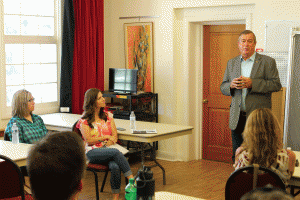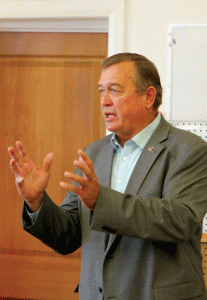By VERNON ROBISON
Moapa Valley Progress

Former U.S. Rep. Cresent Hardy visited Moapa Valley last week in one of the first stops on a four-day campaign trip across the rural areas of the state. The excursion, being billed as the “Nevada Tough” tour, took Hardy to seven different counties in the sprawling Congressional District 4 (CD4) which he hopes to represent once again in Washington DC after the coming November elections.
About two dozen community leaders met with Hardy in the “round-table discussion” held at the Old Logandale School on Wednesday morning, July 25. Among the group were local business owners, town board members, education advocates, officials from local utilities and more.
Hardy is in a rematch with former U.S. Rep. Steven Horsford for the CD4 seat. Hardy beat Horsford in 2014 to win the seat. He then lost in 2016 to current Rep. Reuben Kihuen. Kihuen has declined to seek re-election this year amid claims of sexual misconduct.
Hardy told the group that he originally had no intention of coming back and running for the seat again. “I was looking forward to returning back home and having time to spend with my kids and grandkinds,” he said. “But I believe that when people ask, push and plead with you (to serve again), you have an obligation to consider it. So here I am.”

Hardy acknowledged that he is not a seasoned politican like many who run for Congress. “I’m not university educated and I admit that I’m not a strong public speaker; I’m just a 40-year construction worker,” he said. “But I do have one gift: I am a good listener.”
Hardy said that this quality was something that is needed in Washington. One of the problems on Capitol Hill is that no one is listening anymore, he said.
“Everyone is screaming at each other, but no one is hearing what anyone has to say,” Hardy said. “That doesn’t get us anywhere.”
Hardy expressed his fondness for his home state of Nevada. But he also fears that “we are at the point where we are in danger of losing Nevada.” He pointed to the crucial Governor’s race which could see a Democratic governor along with a Democrat-led state legislature.
“That is just one step away from us becoming Eastern California,” he said. “Now I have nothing against California, they have their ideas. I just wish that they’d keep them in California.”
Hardy said that a main difference between himself and his opponent was the level of connection each candidate maintained with the home state during his term of office.
“In the two-year period I served, there were only two weekends that I didn’t come back home,” Hardy said. “I was always in the district.”
In contrast, Hardy said that Horsford’s visits back to the district during his term of office were few and far between. “He stayed in Washington and rarely travelled back home,” he said. “He still lives back there. He is a paid lobbyist on the Hill. His kids go to school in Virginia. He is not really a Nevadan.”
Throughout the question and answer session that followed, Hardy repeatedly urged local leaders to get involved and “be the change that they wanted to see.”
Overton Power District General Manager Mendis Cooper noted that he and his staff had travelled to Washington annually to visit Hardy when he was in office and discuss issues. Cooper asked what community leaders might do differently to get representatives to work more effectively on behalf of Moapa Valley.
“Whatever you do, do it in person,” Hardy said. “Don’t send a chain letter that has been pre-written by someone else; send a personal letter using your own words. Or go and make a personal visit to the Congressional offices if you can. Those kinds of things coming from real citizens are what get attention.”
MVHS principal Hal Mortensen asked what could be done at the federal level to improve education, and more specifically, to address the mental health problems nation-wide that have caused security problems in public schools.
Hardy emphasized that leadership in education should not come from the top down from the federal level. Rather issues should be decided at the state and local levels. “Each state should create its own system and no system will look quite like another,” Hardy said.
He added that many of the problems in public education could be solved if parents take back their primary role as educators to their own children. “Most of the challenges we face with education in this country are not a money problem, they are really a parenting problem,” he said. “Increasingly we have been just turning our kids over to the education system to be taught. Parents need to take back the primary role.”
On the subject of school security, Hardy said he would establish some early alerts to detect mental illness in kids that might become a problem. He said he would support innovative ways of having local police officers spend more time in the schools among the kids. For example, perhaps computer work stations could be set aside at the schools for police officers to prepare their reports at the school that would usually be done at the police station. Police could spend lunch breaks at their local schools at well, Hardy said.
“These would provide a police presence in the schools, associating with students, without it being oppressive,” Hardy said.
Moapa resident Lisa Wolfley, who serves as President to the local chapter of Power 2 Parent organization, said that her organization struggles with the idea that government subsidies go to groups that then work against what parents want in education.
“We pay our taxes and they are given out as federal grants, or whatever, to these organizations who fight for education policies that we oppose,” Wolfley said. “Then we have to go out and fund-raise again to put up a fight against those policies.”
Hardy said that he generally doesn’t like the granting of federal subsidies at all. “It is not the fed’s role to pick winners and losers,” he said. “I will be the type of guy who will not be giving you any money; but I will not give it to the other side either.”
Moapa Valley Telephone President Brad Lyon pointed out that perhaps the biggest business issue his company faces is working with the Bureau of Land Management (BLM). “We apply for permits for rights-of-way and it takes forever just to get a decision,” Lyon said.
Hardy agreed that this was a struggle that would always require a fight from citizens and businesses. He said that the final solution would probably not come unless decision-making about public lands were allowed to be made closer to home at the state level.
“I think that the states are smart enough to know what to do with the land within their borders,” Hardy said.
Hardy added that when he was in office, he had joined the Western Caucus, a coalition seeking to get federally-controlled lands put back to the state control. At that time there were only 11 representatives involved in the caucus, Hardy said.
“Now there are 37 states in the caucus,” he said. “I would continue on that and we would start to get attention. The states can do a better job of management with less money.”










